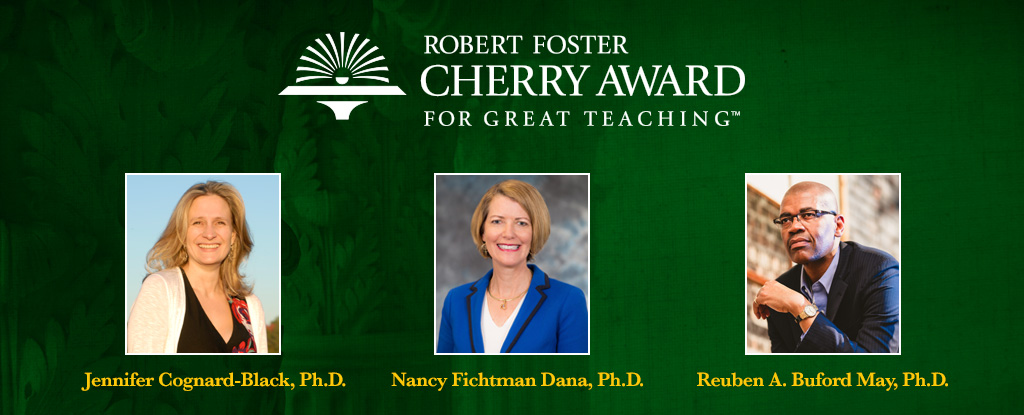Finalists for Cherry Award for Great Teaching to Lecture on Baylor’s Campus

Media Contact: Eric M. Eckert, Baylor University Media and Public Relations, 254-710-1964
Follow Eric on Twitter: @EricBaylorU
Follow us on Twitter: @BaylorUMedia
WACO, Texas (Oct. 11, 2019) – Each of the three finalists for Baylor University’s 2020 Robert Foster Cherry Award for Great Teaching will present a public lecture on Baylor’s campus beginning Monday, Oct. 14.
The Robert Foster Cherry Award for Great Teaching is the only national teaching award – with the single largest monetary reward of $250,000 – presented by a college or university to an individual for exceptional teaching. The winning professor will be announced by Baylor in spring 2020.
As Cherry Award finalists, each professor receives $15,000, as well as $10,000 for his or her home departments to foster the development of teaching skills. Each finalist will present Cherry Award lectures at Baylor during the fall of 2019 and also on their home campuses.
The schedule and lecture descriptions for the Baylor campus are below:
Monday, Oct. 14
Reuben A. Buford May, Ph.D., Presidential Professor for Teaching Excellence and professor of sociology at Texas A&M University, will present “’White Rabbits,’ Dress Codes, Etc.: Exclusionary Practices in Urban Nightlife" at 3 p.m. Monday, Oct. 14, in the Meyer Conference Center, Room 250, in the Foster Campus for Business and Innovation, 1621 S. Third St.
Lecture description: Since the signing of the Civil Rights Act of 1964 outlawing racial discrimination, social scientists and legal scholars have paid particular attention to discrimination in housing and employment but have given much less attention to discrimination in public accommodations, such as restaurants, hotels and nightclubs. May will take the audience on a journey behind the scenes of “nightlife wonderland” – the estimated $19.9 billion United States nightclub industry – to reveal the many ways in which nightclub owners covertly and systematically discriminate against particular groups of patrons in violation of federal law. He will suggest strategies for challenging these exclusionary practices.
Monday, Oct. 21
Jennifer Cognard-Black, Ph.D., professor of English at St. Mary’s College of Maryland, will present “Just Food: Social Justice and the Literatures of Food” at 3:30 p.m., Monday, Oct. 21, in the McLean Foyer of Meditation in Armstrong Browning Library, 710 Speight Ave.
Lecture description: Eating is a story. Every time we take a bite of food, we eat ourselves into being – sustaining our bodies while stirring our imaginations. The tales our dishes tell might be familial, such as aromas conjuring a Croatian grandmother from the old country. They might be historic, taste-memories recalling when butter and sugar were rationed during wartime. Or they might be cultural, flavors evoking religious rituals, agricultural advancements or even culinary fads on social media. Yet whatever our food stories may be, too often they’re nostalgic, triumphant or overly optimistic. In this lecture, Cognard-Black considers how the literatures of food – poems, essays and novels with recipes – can awaken readers to issues of food justice, food justice can move from words to the world, engaging service-learning projects with community partners to address food inequities and environmental degradation sometimes concealed by mainstream discourse. Ultimately, these examples show how honest and fearless food stories can help create more ethical eaters.
Monday, Oct. 28
Nancy Fichtman Dana, Ph.D., professor of education at the University of Florida, will present "When One Teaches, Two Learn: The Role of Inquiry in Inspired Teaching" at 5:30 p.m. Monday, Oct. 28, in Marrs McLean Science, Room 101, 1214 S. Fourth St.
Lecture description: The systematic and intentional study of one’s own teaching practice is key to unleashing the potential that resides within every teacher. Whether helping students learn difficult content or fostering disciplinary investigation and intellectual growth, inspiring teachers inquire into their practices and the students they serve. Journey through the concept of Teacher Inquiry with Fichtman Dana, teacher, researcher and author of 10 books and over 100 articles on the subject, in an exploration of the ways inquiry can impact both PreK-12 learners as well as today’s undergraduate and graduate students.
ABOUT THE ROBERT FOSTER CHERRY AWARD FOR GREAT TEACHING
The Cherry Award program is designed to honor great teachers, stimulate discussion in the academy about the value of teaching and encourage departments and institutions to value their own great teachers. Individuals nominated for the award have proven records as extraordinary teachers with positive, inspiring and long-lasting effects on students, along with records of distinguished scholarship.
The award was created by Robert Foster Cherry, who earned his A.B. from Baylor in 1929. He enrolled in Baylor Law School in 1932 and passed the Texas State Bar Examination the following year. With a deep appreciation for how his life had been changed by significant teachers, he made an exceptional estate bequest to establish the Cherry Award program to recognize excellent teachers and bring them in contact with Baylor students. The first Robert Foster Cherry Award was made in 1991 and has since been awarded biennially. More about the Cherry Award is available at www.baylor.edu/cherry_awards.
ABOUT BAYLOR UNIVERSITY
Baylor University is a private Christian University and a nationally ranked research institution. The University provides a vibrant campus community for more than 17,000 students by blending interdisciplinary research with an international reputation for educational excellence and a faculty commitment to teaching and scholarship. Chartered in 1845 by the Republic of Texas through the efforts of Baptist pioneers, Baylor is the oldest continually operating University in Texas. Located in Waco, Baylor welcomes students from all 50 states and more than 90 countries to study a broad range of degrees among its 12 nationally recognized academic divisions.